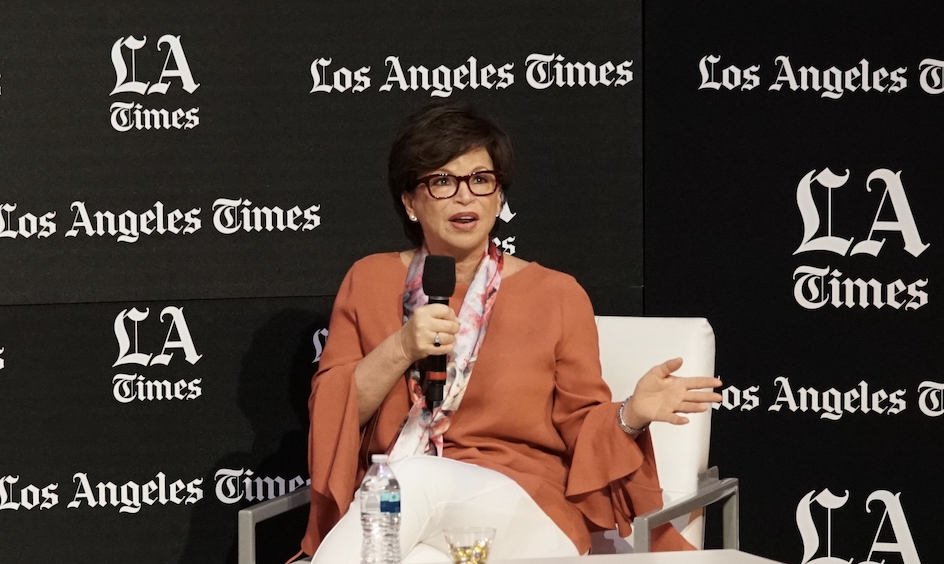Former Obama advisor discusses memoir, career

From his inauguration in 2009 to the end of his presidency in 2017, the United States closely watched and followed former president Barack Obama and his administration. However, what most of the country didn’t see was the behind-the-scenes work done by the president’s advisory council.
“I think the singular failure of the White House press corps covering the Obama White House was that nobody ever captured Valerie Jarrett,” said Jackie Calmes, the White House editor for the Los Angeles Times Washington bureau who moderated a discussion with former White House senior advisor Valerie Jarrett at the L.A. Times Festival of Books Saturday.
About 300 people came to Bovard Auditorium to hear Jarrett talk about her book “Finding My Voice: My Journey to the West Wing and the Path Forward,” which explores her journey as a daughter, mother, lawyer, senior advisor and confidante of the Obama administration, and she advises women to find their voices.
At the event, Jarrett talked about her life before working in the White House.
Calmes described Jarrett as “African American royalty” because of her relation to other black trailblazers. Jarrett’s father, the late James Bowman, was the first tenured black professor at the University of Chicago’s biological sciences division and was director of the university hospital’s blood bank. Her great grandfather, Robert Robinson Taylor, was the first black MIT student and first black architect in the U.S.
Another influential member of Jarrett’s family was her grandmother who they called “Puddin’” because she was “so sweet,” Jarrett said.
“She thought it was important that we appreciate our history in a sense of the sacrifices that were made by family members before us so that it would motivate us and inspire us and give us a sense of where we could go in the infinite possibilities,” Jarrett said.
Jarrett pursued those possibilities starting with law school and eventually working as a senior White House advisor. In the introduction of her book, Jarrett describes her office at a law firm in the Sears Tower in Chicago, and how she realized she no longer wanted to work in corporate law.
“I had a spectacular view of Lake Michigan, and I loved the water, and I would sit there with my back to the door and just cry, and I thought, ‘This must be somebody else’s life. I was not meant to be this miserable,’” Jarrett said.
Jarrett said she called a friend at this time, who told her to consider being a lawyer for the city because her clients would be the people of Chicago, and she could become a part of something bigger and more important than herself. Jarrett said this job was a stepping stone for her appointment in the Obama administration.
Jarrett said she met Michelle Obama when she interviewed Obama for a position at her law firm. She recalled this as the start of their professional relationship and friendship.
“She turned the interview around and the next thing you know, she’s asking me questions, and I don’t have answers to those questions,” Jarett said. “She appreciated at a very early age that it should be a two-way street, not just her selling, but I had to sell too.”
Jarrett said Michelle Obama offered her a job on the spot, even though she didn’t have the authority to do so.
Soon after, Jarrett met Barack Obama at dinner. When she told him she was born in Iran, she received a refreshing response from him. Obama discussed his travels to Indonesia and found that they shared similar views on foreign and domestic policy.
“The other thing we agreed upon was that we could walk into a room and find something in common with just about everybody because we were used to playing with kids who had nothing in common and yet found something in common,” Jarrett said.
Calmes asked Jarrett about her blatant honesty in her book and why she decided to include details about her menstrual cycle and menopause. Jarrett said she wanted to be honest because a lot of people deal with the same experiences.
“I thought, in order for you to trust me, I have to be open with you,” Jarrett said. “I have to tell you the good, the bad and the ugly in order to lure you in so that when I have a very optimistic ending, which is about what you can do to empower our country to be better than it is today, that you might take that leap of faith with me.”
Jarrett’s story touched many audience members, including some USC students who were in attendance. Sophomore Kaili Ganigan and freshman Alene Gipson went to purchase Jarrett’s book after her talk.
“My biggest takeaway would be that, to really just find what you’re passionate about and to not be afraid about the zig-zags in life and that’s where … the magic happens,” said Ganigan, who is majoring in philosophy, politics and law.
Gipson, who is majoring in public policy, said Jarrett’s talk was intimate and conversational, but also inspiring.
“The moment the talk ended, I thought, ‘Oh, so this is what I want to be when I grow up,’” Gipson said. “Just the idea that she’s extremely influential and intelligent and she’s using that to be a good influence on the political environment without having to be this figurehead in the spotlight is so unbelievably appealing.”

